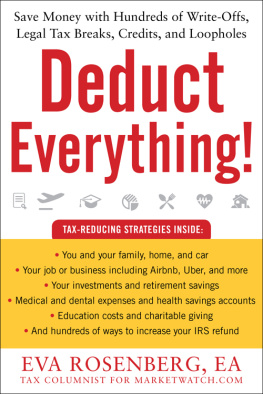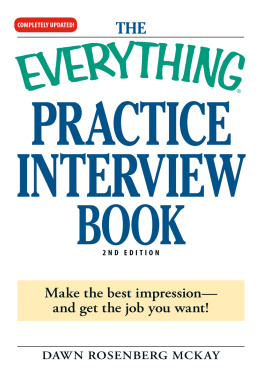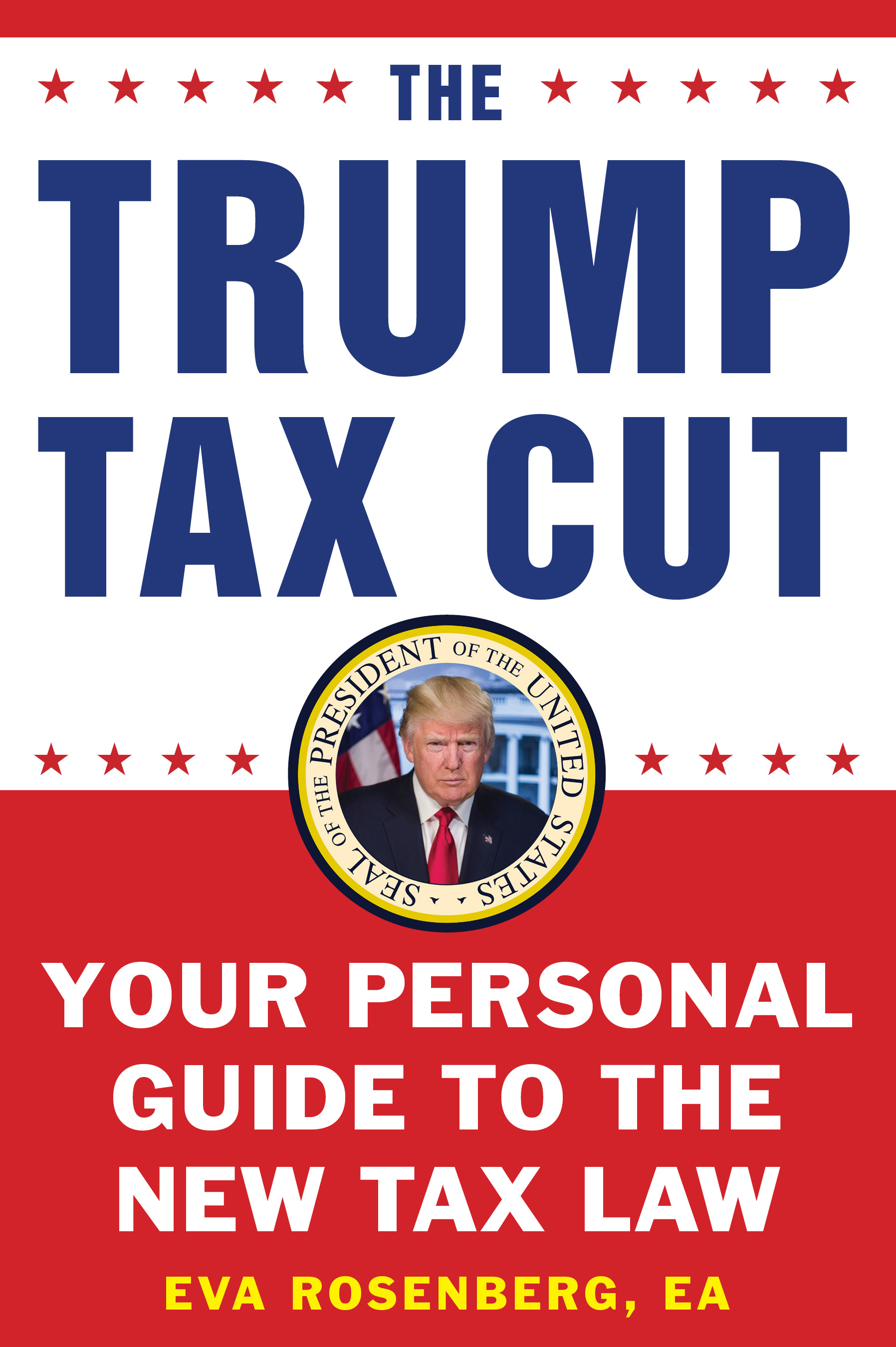The
Trump
Tax CUT
The
Trump
Tax CUT
Your Personal Guide to the New Tax Law
Eva Rosenberg, EA
Humanix Books
The Trump Tax Cut
Copyright 2019 by Humanix Books
All rights reserved
Humanix Books, P.O. Box 20989, West Palm Beach, FL 33416, USA
www.humanixbooks.com | info @humanixbooks.com
Library of Congress Cataloging -in-Publication Data is available upon request.
No part of this book may be reproduced or transmitted in any form or by any means, electronic or mechanical, including photocopying, recording, or by any other information storage and retrieval system, without written permission from the publisher.
Humanix Books is a division of Humanix Publishing, LLC. Its trademark, consisting of the word Humanix, is registered in the Patent and Trademark Office and in other countries.
Disclaimer: The information presented in this book is meant to be used for general resource purposes only; it is not intended as specific financial advice for any individual and should not substitute financial advice from a finance professional.
Portions of this book originally appeared in Deduct Everything by Eva Rosenberg (978-1-63006047-3).
ISBN: 978-1-63006-105-0 (Trade Paper)
ISBN: 978-1-63006-106-7 (E-book)
Printed in the United States of America
10 9 8 7 6 5 4 3 2 1
Contents
The
Trump
Tax CUT
Chapter 1
The Tax Cuts and Jobs Act
How Trumps Tax Plan Benefits You
D uring Donald Trumps historic campaign for president, he promised to reduce and overhaul Americas tax system. President Trump delivered, signing the 185-page Tax Cuts and Jobs Act into law on December 22, 2017. President Trumps Tax Cuts and Jobs Act is among the largest tax cuts in history, including the largest corporate tax cut ever. The nonpartisan Tax Foundation says the Trump tax law will reduce federal revenues, that is taxes paid by individuals and businesses, almost $1.5 trillion over the next decade.
If you worried about adjusting your plans before you filed your 2017 returns, the good news is the Tax Cuts and Jobs Act did not affect your returns for last year. For the most part, the changes will start to affect your 2018 tax return and beyond. If anything does affect 2017, such as the following changes, your tax bill will be reduced.
Top Changes That Affected 2017 (However Briefly) - Charitab le co ntributions. Still deductible, but must be backed up by receipts.
- Medical expenses. Lowers medical expense threshold for 2 years, 2018 and 2019, allowing you to deduct any medical expense over 7.5 percent of adjusted gross income, after it reverts to 10 percent.
- Aircraft transportation fees. Federal transportation taxes are eliminated for private plane owners whose aircraft is operated by a management company. Effective December 22, 2017.
- Bonus depreciation for business. For qualified property placed in service between September 28, 2017, and December 31, 2022 (or by December 31, 2023, for certain property with longer production periods), the first-year bonus depreciation percentage increases to 100 percent. In addition, the 100 percent deduction is allowed for new and used qualifying property.
|
While you proceeded with your 2017 tax return as usual, it is important that taxpayers begin to understand how the Trump tax law changes their tax situation on a personal and a business level.
This book is an excellent starting point. If you have significant changes to your tax status, especially for business owners, you may seek out expert advice to fully benefit from the new law. The changes to the Tax Code are sweeping and will affect every individual and business return in 2018. This purpose of this book is to offer you tax strategies that will help both individuals and small business maximize their benefits and reduce their tax payments under the Tax Cuts and Jobs Act.
Key Benefits for Individuals in the New Law - Personal tax brackets are lower.
- Child Tax Credit is increased.
- Standard deduction is increased.
- Charitable contributions limits are increased to 60 percent of income.
- Medical expenses are easier to deduct with a lower threshold.
- Unpaid 401(k) loans: There is more time to repay after job termination.
- Estate and gifts tax lifetime exclusion rises.
- Section 529 education funds may be rolled over.
- Section 529 education funds may be used to pay for private elementary and secondary school tuition.
- Student loans discharged due to death or disability will not generate cancellation of debt income.
|
Provisions for Individual Under the Law
If a deduction or tax break is suspended, it means the change is only temporary. Most of the changes in the tax law affect the years starting on January 1, 2018, and expire on December 31, 2025 unless otherwise specified. Here are several key changes:
The ACA mandate is repealed. In January of 2017, President Trump issued an executive order eliminating any penalties for individuals who did not get health insurance under the ACA mandate rules.
But the IRS itself felt the presidents executive order did not give them the legal authority to wipe out the penalty for not having insurance. Thus, for the 2017 tax returns, all filers had to fill out the forms and answer the questions about their insurance coverage or exemption. Not answering the questions generated a penalty, approximately 2.5 percent of your annual household income. Under the new tax law the penalty will stay in effect for the full year 2018, and filers in 2019 must prove they had adequate coverage or an exemption; otherwise they will face an automatic penalty.
What if you totally cannot afford the cost of the health insurance? You have a couple of options to help you get coverage:
- If your income is below the poverty level, perhaps you qualify for assistance via state or local programs such as Medi-Cal (in California).
- Also, check the HealthCare.gov website to see if you qualify for any of the exemptions: https://www.healthcare.gov/health-coverage-exemptions/ . Some of them require that you file paperwork. Get started on that paperwork immediately.
And if you simply, flat-out cannot afford the insurance, in your budget? Well, heres one way to get around the penalties. Reduce your withholding or estimated payments so you owe a small balance on April 15 (in 2018, the filing deadline is April 17).
Theres an odd provision in the ACA rules regarding how the IRS can collect these ACA penalties. It may only take the penalties out of your refunds. The IRS is not permitted to garnish your wages or levy your bank accounts or other assets. So if you dont have a refund for the next 10 to12 years, you will never have to pay the ACA penalties. ( Note: The IRS can collect balances due for 10 years after the balance is assessed. The last penalty will be assessed in 2019 for the 2018 tax return. )
There are new tax brackets for individuals (see chart).
If taxable income is: | The income tax equals: |
Single Individuals |
Not over $9,525 | 10% of the taxable income |
Over $9,525 but not over $38,700 | $952.50 plus 12% of the excess over $9,525 |
Over $38,700 but not over $82,500 | $4,453.50 plus 22% of the excess over $38,700 |
Over $82,500 but not over $157,500 | $14,089.50 plus 24% of the excess over $82,500 |













